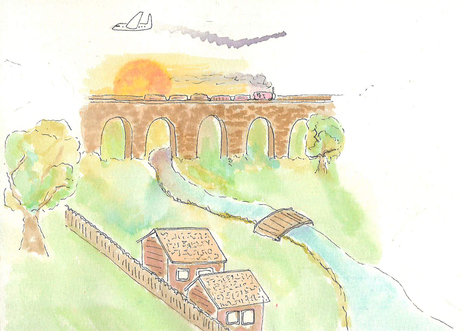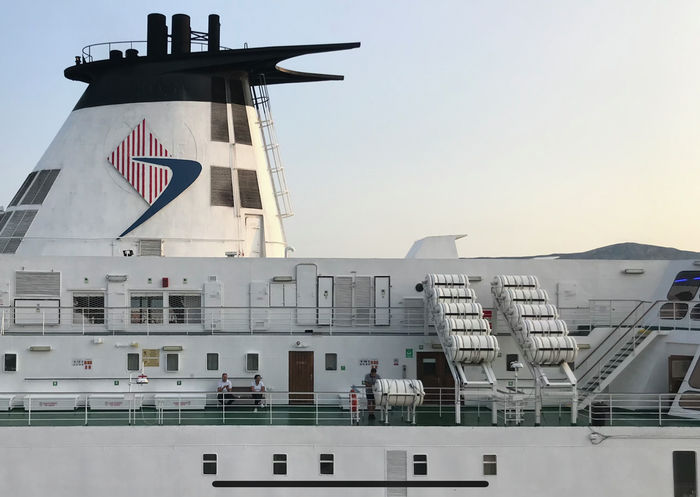Coming down to Earth with Cambridge’s flight-free travellers
Students are trading the runway for the railway. Alex Levy speaks to those charting a more sustainable course.

The sun grew low in the sky over Mount Pantokrator on Corfu, and I had four hours til I left for Italy. Watching creaking car ferries chug in and out of the port, sleek jets roared overhead at regular intervals, making broad turns over the bay before disappearing with a twinkle into the pale orange of the dusk. In four hours I had a beer, watched Greek men pontificate from within a cloud of cigarette smoke, and considered the long journey ahead with trepidation: across the Adriatic by night, along the spine of Italy, meandering through the Alps to Munich, and on to London. A rich patchwork of terrain, language, interchange - a highly impractical one.
“I get my best night’s sleep on a train” - lucky for Rosie Smart-Knight, finalist at Trinity Hall, who last flew three years ago. “Going to sleep in one place, feeling the rhythms of the train and waking up to the sunrise over a place you’ve never seen before. There’s something that feels really romantic about it”. But for all its Agatha Christie allure, it’s “often incredibly stressful.”
Air travel, by contrast, is a well-oiled institution. Over the last twenty years, the hegemony of easyJet and Ryanair has brought a host of global cities and balmy suntraps within easy reach of the UK, democratising travel for working people on tight schedules, and students on even tighter budgets. All highly appealing, even in a world on the brink of climate catastrophe. But unease has been creeping into the minds of a growing proportion of the population.
“Flying is basically the most time and cost-efficient way of producing CO2 for an individual”
“Flying is basically the most time and cost-efficient way of producing CO2 for an individual,” William Smith, a PhD candidate at the University’s Centre for Climate Repair, told me. It is the environmental factor which drives William and Rosie to forego both flights and meat. A natural response to what seems a pretty tall order is to ask, where is the government in all this, and why should we as students make the sacrifice?
The answer, ironically, might be to think a little further afield. “People are generally quick to blame climate change on the rich,” said Will, “but if you are someone who has regular access to flying, as we are, you are the rich globally. 80% of the world’s population has never set foot on a plane and it causes 2-3% of global emissions.” He doesn’t agree with pitting the individual against companies and governments - “an institutional change will be an individual change at the end of the day; if you want the government to ban domestic flying,” (as France’s has done) “you will still have to stop flying domestically. Are you going to wait for the government to tell you?”
Considering climate change’s disproportionate impact on the Global South and her middle-class background in Britain, Rosie agrees: “in order to feel ok about living this life of immense privilege and often immense damage to other people’s ability to live, I have to make sacrifices.” But government action is imperative, and she says we can’t talk about taxing flights without improving access to alternative forms. Will stresses voting as probably the biggest single thing an individual can do.
Despite their principles, William gave the important exception of international students, and Rosie is conscious that in an overwhelming world, what people can do is highly individual; not everyone sees this as a worthy or affordable sacrifice. At the time of writing, covering 1500km for an early-December sojourn in Rome sets you back just £34. Hot-footing it to the continent mid-term is also on the table, considering that with favourable queues at low-cost paradise Stansted, you can be in Cambridge within an hour and a half, evidenced by viral posts and TikToks of students popping to Milan for pizza and a spritz.
"Flying mirrors a modern culture of time scarcity and instant gratification; we can’t be conscious within experiences"
But slow-travel proponents are sceptical of this shrinking world. In Rosie’s opinion, when flying “we don’t have to critically engage with how we are able to go from one place to another and how one place evolves through space. You walk through security and the most inconvenient thing that happens is you have to take off your belt.” She feels flying mirrors a modern culture of time scarcity and instant gratification; we can’t be conscious within experiences, “because the system is designing it so we don’t see all the workings going on around it.” We accept convenience as unquestionably positive, but “there is something beautiful about taking the time to do something as a process, not as a means to an end.”
In those extra hours, you meet and strike up conversations with fellow travellers. I practised my Italian with a family between Turin and Paris, and Rosie met a Florentine university professor who gave her a contact that has proved useful in writing her dissertation.
Sadly, students have the time but often not the finances to fund flight-free travel, even excluding the extra costs of getting to London and across the channel. Newcomer Byway, a flight-free travel agency, offers a tailored alternative for those with more cash (though they recently released a collection of “Gen Z tailored trips” after bookings from the demographic “went up 430% year on year.”) A recent survey they ran with OnePoll revealed a number of “real or perceived barriers people see with flight-free travel: Over a quarter (27%) said planning and booking a flight-free trip felt like too much hassle, with nearly one in ten (8%) reporting they wouldn’t know how to organise [it]”
Proving the point, fellow editor Anna Metzger recently had to abandon a flight-free trip to Ireland due to disruption, and complex routes often pose difficulty. For Byway, “the trick is to remove the faff and hassle to easily give travellers a taste of just how joyful slow travel can be.” Speaking to a travel consultant at a top high street brand revealed this thinking to be far from mainstream, however, as “people want a tailor-made, high-quality holiday for a price they feel is a deal…most of the time, sustainability never comes into that equation”.
The pandemic forced a sobering look in the mirror for business travellers (reflections ashen-faced from gruelling hops between London, Frankfurt and New York), but commercial flights have rallied post-COVID. A pressing question for universities, too, with The Independent reporting in 2020 that eight institutions, Cambridge included, had spent ‘tens of millions’ on ‘170,000 flights’ in the four years previous. Another moral dilemma for climate scientist William, whose second last flight was for a conference in Main. While he initially doubted the necessity of in-person attendance, he found it “incredibly useful”, though on balance believes people should think twice.
William’s boat club has a training camp next year in Spain, and as captain he pushed for the club to travel flight-free, facing resistance. In the end, a route by two trains and a coach has worked out at £50 more, a relatively small proportion of the trip’s total cost, but only one of his teammates will join him. The university’s policy on travel does not seem to produce a coherent approach across the collegiate university. The same seems to be the case globally, with aviation existing in an international grey-zone criss-crossed by thousands of aircraft daily; the industry is not as easily-regulated as others. The Paris Climate Agreement, already considered a lame duck by some, does not include aviation emissions in its ‘Nationally Determined Contributions’, and Corsia has been criticised for its lack of breadth and acceptance of damaging biofuels.
William sees perceptions of green travel as a significant psychological barrier: “people will only change when they think of something as normal, and they’ll only think that when they see other people doing it.” To that end, visibility and discourse is key to shedding the image of the “weird environmentalist” - a favourite naysayer’s retort is that ‘the flight is going anyway’, but your choice not to fly may encourage another person to think again. Confirmed by Lucy Fowler, Byway marketing manager: “94% of our customers say they'd book another Byway trip or refer a friend on homecoming…there's a snowball effect, with train-based options gathering momentum.”
Longer-term carbon offsetting is ineffective if we consider climate change an urgent crisis, and biofuels give rise to a ‘fuel vs food’ tension which could exacerbate impacts on food security. Ultimately, slow travel may remain too expensive to become a realistic option for students, limited to one-off interrail trips. But it is slowly entering the mainstream, with 67% in the UK in 2020 saying they are willing to fly less for the sake of the environment, and new sleeper routes opening across Europe, notably between Paris and Berlin, Rome and the Dolomites. Is there hope the trend could accelerate, bringing ever more people down to earth? Will says “it’s got to. There’s no such thing as sustainable aviation.”
 News / Cambridge students set up encampment calling for Israel divestment6 May 2024
News / Cambridge students set up encampment calling for Israel divestment6 May 2024 News / Cambridge postgrad re-elected as City councillor4 May 2024
News / Cambridge postgrad re-elected as City councillor4 May 2024 News / Proposed changes to Cambridge exam resits remain stricter than most7 May 2024
News / Proposed changes to Cambridge exam resits remain stricter than most7 May 2024 News / Some supervisors’ effective pay rate £3 below living wage, new report finds5 May 2024
News / Some supervisors’ effective pay rate £3 below living wage, new report finds5 May 2024 Fashion / Class and closeted identities: how do fits fit into our cultures?6 May 2024
Fashion / Class and closeted identities: how do fits fit into our cultures?6 May 2024






